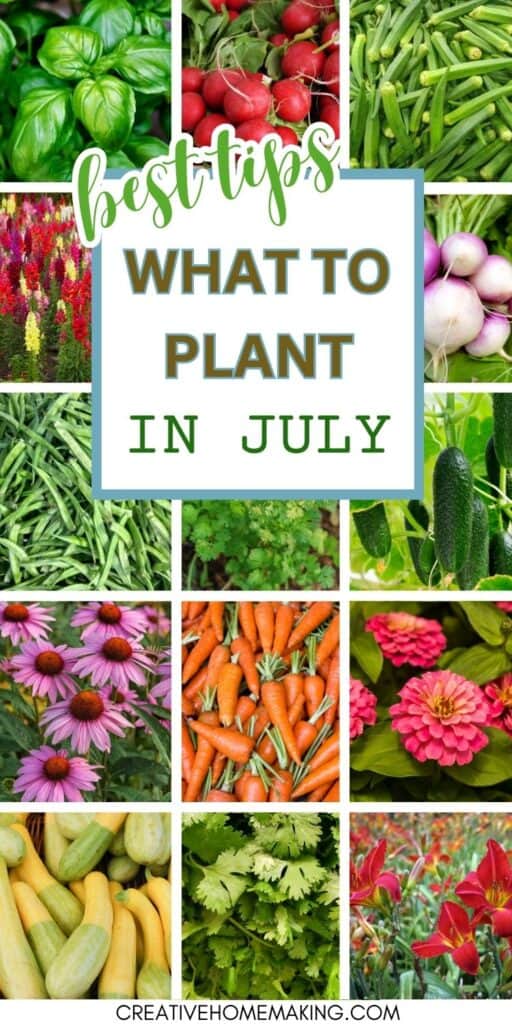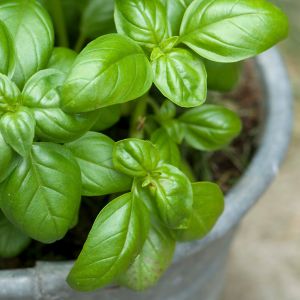July is a great time to start planting in the garden. Although many people believe that it is too late to plant vegetables and herbs in July, there are still plenty of options available. In fact, many edibles, including both vegetables and herbs that yield multiple harvests, can be planted in midsummer for a fruitful bounty come fall.
This post may contain affiliate links.
Choosing the Right Plants for July Planting
When it comes to planting in July, choosing the right plants is key to a successful harvest. Whether you’re planting vegetables, herbs, or flowers, there are certain things to keep in mind to ensure that your plants thrive in the summer heat.
Related Article: How to Grow Zinnias
Vegetables
When it comes to vegetables, there are plenty of options for planting in July. Bush beans, cucumbers, and summer squash are all great choices, as they will continue to produce throughout the summer. Root vegetables like carrots and turnips can also be planted in July for a fall harvest.
If you’re looking for something a little different, consider planting heat-loving vegetables like tomatoes, peppers, and okra. These plants thrive in hot weather and will produce an abundant harvest if cared for properly.

Herbs
July is a great time to plant herbs like basil, cilantro, and parsley. These fast-growing herbs can be started from seed or purchased as young plants and will continue to produce throughout the summer.
Other herbs to consider planting in July include dill, oregano, and thyme. These herbs are also fast-growing and can be used in a variety of dishes.
Related Article: How Far Apart to Plant Green Beans: A Quick Guide
Flowers
If you are looking to add some color to your garden, there are plenty of flowers that can be planted in July. Cornflowers, sweet rocket, and Iceland poppies are all great options for adding some color to your garden.
Perennials like daylilies and coneflowers can also be planted in July for a beautiful display year after year.
When choosing flowers to plant in July, it’s important to consider the climate in your area. Heat-loving flowers like marigolds and zinnias will thrive in hot weather, while others like pansies and snapdragons prefer cooler temperatures.
Related Article: What to Plant in October: A Guide to Fall Gardening
Preparing Your Garden for July Planting
July is a great time to plant various vegetables and flowers, but it’s important to properly prepare your garden beforehand to ensure a successful harvest. Here are some tips to help you get started:
Watering
Proper watering is crucial for healthy plant growth, especially during the hot summer months. Make sure to water your garden deeply and regularly, aiming for at least an inch of water per week. Consider using a drip irrigation system to help conserve water and ensure even watering.
Related Article: Grow Big Tomatoes in Pots: Tips and Tricks for a Bountiful Harvest
Pests
Unfortunately, pests can be a common problem in the garden during the summer. One common pest to watch out for in July is flea beetles, which can damage brassicas such as cabbage, broccoli, and kale. Consider using row covers or insecticidal sprays to protect your plants.
Succession Planting
Succession planting is a great way to keep your garden producing throughout the season. Consider planting new crops every few weeks to ensure a continuous harvest. Some great vegetables to plant in July for succession planting include beans, carrots, and radishes.
First Frost Date
It’s important to know your area’s first frost date so you can plan your garden accordingly. In general, most areas can expect their first frost between September and November. Keep this in mind when choosing what to plant in July, as some crops may not have enough time to mature before the first frost. Consider planting quick-maturing crops such as lettuce, spinach, and radishes.
Related Article: Best Fertilizer for Peppers
Caring for Your July Garden
Taking care of your garden in July can be a bit challenging, but with proper care and attention, you can ensure a healthy and productive garden. This section will discuss some essential tips for caring for your July garden.
Pruning
Pruning is an essential part of maintaining a healthy garden, and it is especially important in July. Here are some tips for pruning your garden in July:
- Remove dead and diseased branches from trees and shrubs.
- Pinch back the tips of herbs and flowers to encourage bushier growth.
- Deadhead spent blooms to encourage new growth and prolong flowering.
- Prune back any overgrown or leggy plants to encourage new growth.
Related Article: Bush Beans Square Foot Gardening: Maximize Your Harvest with Ease
Cropping
Cropping is another essential aspect of caring for your July garden. Here are some tips for cropping your garden in July:
- Harvest fruits and vegetables as soon as they are ripe to encourage more growth.
- Keep an eye out for pests and diseases and take appropriate action to prevent them from spreading.
- Water your garden regularly, especially during hot and dry weather.
- Fertilize your plants with a balanced fertilizer to promote healthy growth and fruiting.
When planting flowers in July, it is important to consider your zone and the specific needs of the flowers you are planting. With the right care and attention, these flowers can add a beautiful touch to your garden.
Follow my gardening board on Pinterest.



Thanks! I got my whole garden in the ground in June. But I just started 18 basil plants to add in here and there because can you really have too much basil?